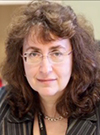
Contributions
Abstract: EP1421
Type: ePoster
Abstract Category: Clinical aspects of MS - 9 Economic burden
Background: The Fraser Health Authority (FHA) is the largest and fastest growing health region in British Columbia (BC), serving a population base of 1.46 million in an area of approximately 10,000 square kilometres. Travel time from east to west borders is 2 hours. The Fraser Health Multiple Sclerosis (FHMS) Clinic was established August 2004 in Burnaby BC to serve more than 3000 persons living with multiple sclerosis (MS). The large geographical area, coupled with the limited specialized resources creates physical, financial and/or geographical accessibility barriers. To address this issue, in April 2015, the FHMS Clinic opened a Satellite Clinic in Abbotsford Regional Hospital, located more centrally in the area. To maintain a high level of specialty care, a nurse clinician and MS neurologist travelled to the clinic weekly.
However, travel time and cost to the satellite clinic and the inability to attend to the nursing duties in the Burnaby clinic were significant factors that lead to the development of a unique tele health model of nursing care. The Virtual Nursing Program (VNP) commenced in June 2016, and continues to function with a rotation of MS neurologists, who see the patients in Abbotsford, and an assistant, to connect the patient through Skype for Business (S4B) with the nurses who are situated in the clinic in Burnaby.Nurses replicate educating, counselling, monitoring and managing MS symptoms through technology. The physician can communicate with the nurses via S4B to discuss each patient and the care plan, as they do in the Burnaby site. Additionally, education materials are handed to the patients, by the assistant, as directed by the nurses.GOAL: To determine if MS patients, MS neurologists and MS nurses participating in the VNP are satisfied with this mode of care.
Method: A satisfaction survey using a 5-point Likert scale was given to 59 MS patients, 3 neurologists and 2 nurses.
Results: Results of the survey were analyzed for level of participant satisfaction, recommendations, and verbal feedback of experience. A majority of the patients scored very satisfied, with overall scores improving as the clinic gained experience in this mode of care delivery. Few patients noted preference for face to face interaction. Neurologists and nurses scored similarly.
Conclusion: Satisfaction with the virtual nursing program confirmed the viability of providing specialized care to patients in poorly accessible areas of the health region.
Disclosure:
Dr. Galina Vorobeychik reports personal compensation for consulting and research support for Biogen Idec, Genzyme, Novartis, Roche, Serono Merck, Teva Neuroscience.
Anna Kazimirchik, RN, MSCN: I have received honorariums for participation in nursing advisory boards from the following Pharmaceutical companies: Novartis Pharmaceuticals Canada Inc., EMD Serono, Genzyme Canada, Teva Canada Innovation, Biogen Canada Inc.
Jill Nelson, RN, BScN, MSCN: I have received honorariums for participation in nursing advisory boards from the following Pharmaceutical companies: Novartis Pharmaceuticals Canada Inc., EMD Serono, Genzyme Canada, Teva Canada Innovation, Biogen Canada Inc., Roche Canada
Abstract: EP1421
Type: ePoster
Abstract Category: Clinical aspects of MS - 9 Economic burden
Background: The Fraser Health Authority (FHA) is the largest and fastest growing health region in British Columbia (BC), serving a population base of 1.46 million in an area of approximately 10,000 square kilometres. Travel time from east to west borders is 2 hours. The Fraser Health Multiple Sclerosis (FHMS) Clinic was established August 2004 in Burnaby BC to serve more than 3000 persons living with multiple sclerosis (MS). The large geographical area, coupled with the limited specialized resources creates physical, financial and/or geographical accessibility barriers. To address this issue, in April 2015, the FHMS Clinic opened a Satellite Clinic in Abbotsford Regional Hospital, located more centrally in the area. To maintain a high level of specialty care, a nurse clinician and MS neurologist travelled to the clinic weekly.
However, travel time and cost to the satellite clinic and the inability to attend to the nursing duties in the Burnaby clinic were significant factors that lead to the development of a unique tele health model of nursing care. The Virtual Nursing Program (VNP) commenced in June 2016, and continues to function with a rotation of MS neurologists, who see the patients in Abbotsford, and an assistant, to connect the patient through Skype for Business (S4B) with the nurses who are situated in the clinic in Burnaby.Nurses replicate educating, counselling, monitoring and managing MS symptoms through technology. The physician can communicate with the nurses via S4B to discuss each patient and the care plan, as they do in the Burnaby site. Additionally, education materials are handed to the patients, by the assistant, as directed by the nurses.GOAL: To determine if MS patients, MS neurologists and MS nurses participating in the VNP are satisfied with this mode of care.
Method: A satisfaction survey using a 5-point Likert scale was given to 59 MS patients, 3 neurologists and 2 nurses.
Results: Results of the survey were analyzed for level of participant satisfaction, recommendations, and verbal feedback of experience. A majority of the patients scored very satisfied, with overall scores improving as the clinic gained experience in this mode of care delivery. Few patients noted preference for face to face interaction. Neurologists and nurses scored similarly.
Conclusion: Satisfaction with the virtual nursing program confirmed the viability of providing specialized care to patients in poorly accessible areas of the health region.
Disclosure:
Dr. Galina Vorobeychik reports personal compensation for consulting and research support for Biogen Idec, Genzyme, Novartis, Roche, Serono Merck, Teva Neuroscience.
Anna Kazimirchik, RN, MSCN: I have received honorariums for participation in nursing advisory boards from the following Pharmaceutical companies: Novartis Pharmaceuticals Canada Inc., EMD Serono, Genzyme Canada, Teva Canada Innovation, Biogen Canada Inc.
Jill Nelson, RN, BScN, MSCN: I have received honorariums for participation in nursing advisory boards from the following Pharmaceutical companies: Novartis Pharmaceuticals Canada Inc., EMD Serono, Genzyme Canada, Teva Canada Innovation, Biogen Canada Inc., Roche Canada


